Is Sadiq Khan Still the Mayor of London in 2025?
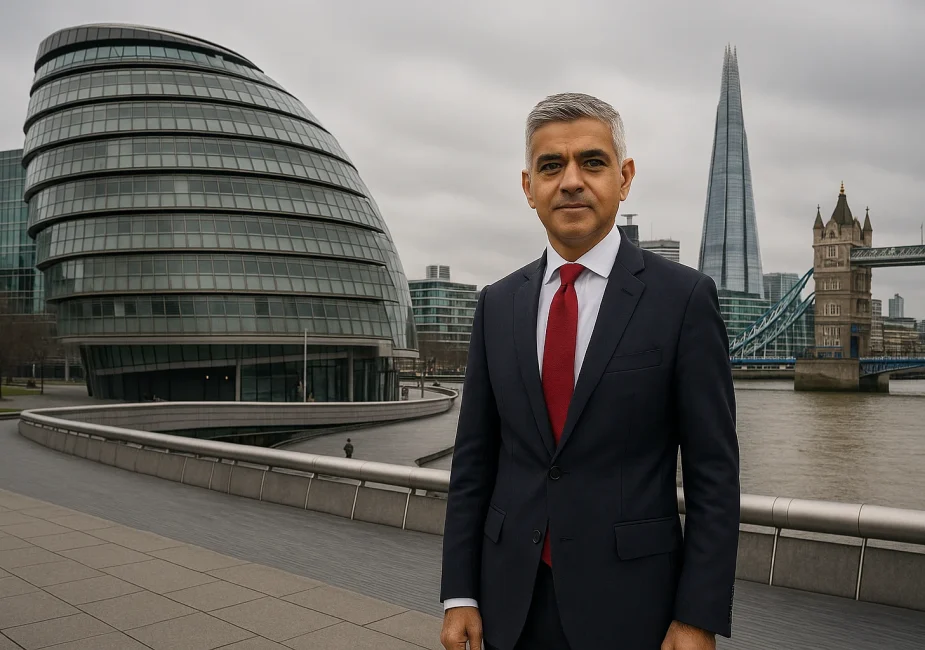
Sadiq Khan’s leadership of London has shaped the capital’s political and social direction since 2016. As the city continues to evolve post-pandemic, many are asking whether Khan still holds office and what impact his tenure has had.
With a focus on transport, housing, and environmental reform, his influence remains significant. This article explores Khan’s current role in 2025, his re-election history, key policies, and the challenges facing his administration in the years ahead.
Who Is Sadiq Khan and What Is His Role as Mayor of London?
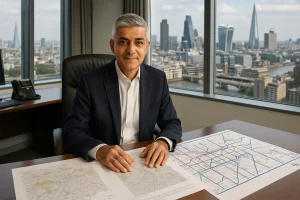
Sadiq Aman Khan is a British politician serving as the third and current Mayor of London, having first assumed office on 9 May 2016. Born in Tooting, South London, in 1970, he rose from a working-class background to become one of the most influential political figures in the United Kingdom.
Before his mayoralty, Khan served as Member of Parliament (MP) for Tooting between 2005 and 2016 and held several positions within both the Labour government and the opposition’s Shadow Cabinet.
As Mayor, his duties span a wide range of urban and administrative responsibilities, including:
- Overseeing London’s transport network through Transport for London (TfL)
- Developing and implementing housing and planning policies
- Managing the Metropolitan Police and London Fire Brigade
- Leading environmental, cultural, and social initiatives for the city
- Representing London domestically and internationally
Khan’s leadership has focused heavily on issues such as clean air, affordable housing, and promoting inclusivity across the capital.
Sadiq Khan’s Biography
| Category | Details |
| Full Name | Sir Sadiq Aman Khan |
| Date of Birth | 8 October 1970 |
| Place of Birth | Tooting, London, England |
| Nationality | British |
| Education | University of North London (Law), University of Law |
| Occupation Before Politics | Human Rights Solicitor |
| Political Party | Labour Party |
| Ideology | Social Democrat, Soft Left |
| Religion | Islam |
| Marital Status | Married to Saadiya Ahmed (since 1994) |
| Children | Two daughters |
| First Elected as MP | 5 May 2005 (for Tooting) |
| Mayor of London | Since 9 May 2016 |
| Deputy Mayor | Joanne McCartney |
| Preceded by | Boris Johnson |
| Re-elected | 2021 (Second Term), 2024 (Third Term) |
| Honours | Sitara-e-Imtiaz (2018), Knighted in 2025 |
| Key Achievements | ULEZ Expansion, Hopper Fare, Diversity Commission |
Sadiq Khan remains one of the most recognised British politicians globally. His tenure has been shaped by his pragmatic governance style and commitment to making London greener, safer, and more inclusive for its residents.
Is He Still London’s Mayor?
Yes, Sadiq Khan is still the Mayor of London in 2025. He secured his position for a third consecutive term following his victory in the London mayoral election held on 2 May 2024. This made him the first person to be elected three times to the office since the role was established in 2000.
Khan’s current term officially began in May 2024 and is expected to run until May 2028, in line with the standard four-year mayoral term set out by the Greater London Authority Act. There are no legal limits on how many terms a Mayor of London can serve, meaning Khan could continue in office beyond 2028 if he chooses to stand again and win.
His third-term victory came despite challenges from political opponents, public debates around policies such as the Ultra Low Emission Zone (ULEZ), and concerns about crime and transport. His re-election confirmed that he still maintains significant support across key areas of the capital, especially in inner London boroughs.
Khan’s ongoing leadership ensures continuity in the city’s governance and allows further implementation of his policy agenda focused on affordability, sustainability, and public safety.
Was Sadiq Khan Re-elected in the 2024 London Mayoral Election?
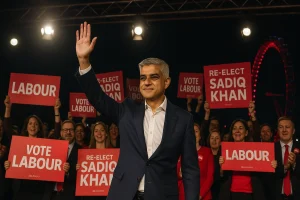
Yes, Sadiq Khan won re-election in May 2024, securing a third term as Mayor of London. He became the first person in the capital’s history to win three consecutive terms.
The election was particularly notable due to the polarised debate over the expansion of the Ultra Low Emission Zone (ULEZ), cost of living issues, and public safety. Khan ran as the Labour Party candidate and defeated Conservative Susan Hall, among other challengers.
London Mayoral Election 2024 – Result Summary
| Candidate | Party | Votes Received | Outcome |
| Sadiq Khan | Labour | Majority Vote | Elected |
| Susan Hall | Conservative | Second Place | Defeated |
| Other Candidates | Various | Minority Vote | Eliminated |
Voter turnout was lower than expected, particularly in suburban areas where ULEZ was unpopular. However, Khan’s strong support in inner London helped him secure a decisive victory.
What Has Sadiq Khan Achieved During His Time as Mayor?
Since taking office in 2016, Sadiq Khan has made a wide range of policy decisions that have reshaped London’s transport network, environmental agenda, housing strategies, and social outlook. His achievements span nearly a decade of leadership and reflect his long-standing commitment to making London a more inclusive, liveable, and sustainable city.
Transport and Infrastructure
Khan has prioritised public transport accessibility and affordability since the beginning of his first term. One of his earliest policies was the introduction of the Hopper fare, allowing passengers to make unlimited bus and tram journeys within an hour at a single fare. This initiative particularly benefited lower-income Londoners who rely on surface transport across multiple routes.
He also supported the launch and expansion of the Night Tube service on Fridays and Saturdays, which was originally proposed before his tenure but delivered during it. His backing of the Elizabeth Line (Crossrail) was critical, especially during the COVID-19 pandemic when construction timelines and finances were under pressure.
Although he initially froze fares on Transport for London (TfL) services, financial constraints later required him to negotiate with the central government. In return for emergency bailout packages totalling billions of pounds, Khan implemented fare increases and adjustments to the congestion charge, extending its hours and increasing its cost.
Under his leadership, TfL introduced digital innovations and made steps toward greater accessibility across the underground network.
Air Quality and Environmental Reforms
Khan’s environmental policies have been some of the most high-profile of his mayoralty. His administration first introduced the Toxicity Charge (T-Charge) in 2017 to discourage the use of older, more polluting vehicles in central London.
This was followed by the Ultra Low Emission Zone (ULEZ) in 2019, initially covering central London, then expanded to inner London in 2021 and finally to all of Greater London in August 2023. ULEZ has been a defining feature of his administration, aimed at reducing nitrogen dioxide levels and promoting cleaner air across the city.
Although the policy sparked backlash, especially in suburban boroughs, it achieved measurable results. The number of highly polluting vehicles entering the zone dropped significantly, and early studies showed improvements in air quality and reduced exposure to harmful emissions.
He also launched a school air quality audit programme, targeting primary schools in the most polluted areas, and supported efforts to expand cycling infrastructure and electric vehicle charging networks.
Housing and Urban Development
Khan has consistently identified the housing crisis as one of the city’s greatest challenges. His creation of Homes for Londoners, a dedicated initiative to increase the delivery of affordable and council homes, was a cornerstone of his strategy.
His administration focused on:
- Accelerating construction on public land
- Prioritising genuinely affordable housing over luxury developments
- Introducing the London Living Rent model for intermediate renters
While he has increased funding and set ambitious targets, his housing programme has faced limitations due to land availability, planning delays, and insufficient support from national government schemes. Nonetheless, Khan has approved more council homes than any mayor since the GLA was established.
He has also taken a stance against speculative development, calling out foreign investors who treat London homes as financial assets rather than places to live.
Public Health and COVID-19 Response
Khan’s leadership during the COVID-19 pandemic was defined by advocacy for public health safety, clear communication, and transport management. He was the first UK political leader to call for mandatory face masks on public transport, even before national guidance was issued.
During the crisis:
- TfL implemented service reductions to protect frontline workers
- Over 7,000 TfL employees were furloughed to manage financial losses
- Emergency funding of £1.6 billion was secured to keep services operational
He declared a “major incident” in London during infection spikes, calling on the government to impose circuit-breaker lockdowns and tighter restrictions. He also worked closely with the NHS and local authorities to support vaccine rollouts and protect vulnerable communities.
However, critics noted that some of his pandemic-era policies, such as the increased congestion charge and fare rises, placed additional burdens on essential workers and residents.
Crime, Safety and Policing
As Police and Crime Commissioner for London, Khan holds direct responsibility for setting priorities for the Metropolitan Police. His terms in office have coincided with challenging national trends in crime, particularly involving knives and youth violence.
Khan has invested in community-led violence reduction programmes, expanded support services for victims, and lobbied the national government for more policing resources. He has frequently argued that cuts in central government funding for the police, youth services, and social support have undermined city-level efforts to tackle crime.
Knife crime and homicides saw a rise in his first term, followed by a decline after 2020, partly influenced by pandemic restrictions. By 2024, London’s gun crime rate had reached its lowest levels in years, though overall perceptions of safety remained a political challenge.
Diversity, Inclusion and Social Policy
Sadiq Khan has consistently positioned London as a global capital of diversity and inclusion. In response to the Black Lives Matter movement and the George Floyd protests, he established the Commission for Diversity in the Public Realm to review and recommend changes to London’s statues, building names, and monuments that reflect the city’s history more accurately and inclusively.
He has actively supported events such as:
- Pride in London
- Eid in the Square
- Holocaust Memorial Day
- Black History Month celebrations
During Ramadan and other Islamic holidays, Khan has used his platform to promote religious understanding and combat extremism, racism, and Islamophobia.
His speeches often reflect his background as a British Muslim and son of Pakistani immigrants. He continues to be an outspoken critic of far-right nationalism and divisive rhetoric, especially in the context of international politics.
National and International Recognition
Khan has gained recognition beyond the UK, often cited as a key progressive voice among global city leaders. His mayoralty has attracted international attention, especially for his responses to:
- Brexit and its impact on London’s global status
- US relations, particularly during Donald Trump’s presidency
- Climate leadership, including participation in global sustainability networks
In 2025, Khan became the first Mayor of London to be awarded a knighthood, recognised for his political and public service. He has also received honours such as:
- Sitara-e-Imtiaz from Pakistan (2018)
- Honorary Fellowship from the Royal Institute of British Architects
- Inclusion in TIME 100 list of influential people
His legacy continues to develop in his third term, with the potential for long-term national influence still on the horizon.
How Long Can a Mayor of London Serve?
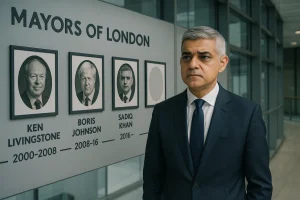
There are no legal term limits for the Mayor of London. The role is subject to re-election every four years. If a candidate continues to win at the ballot box, they may serve multiple terms.
Sadiq Khan’s timeline as Mayor:
| Term | Election Date | Term Duration | Status |
| First Term | May 2016 | 2016 to 2021 | Completed |
| Second Term | May 2021 | 2021 to 2024 | Completed |
| Third Term | May 2024 | 2024 to 2028 | Ongoing |
Each term is intended to last four years, although the second term was extended slightly due to the delay caused by the COVID-19 pandemic.
What Are the Key Challenges Facing London Under Sadiq Khan in 2025?
London in 2025 continues to experience several complex and interrelated challenges, many of which were exacerbated by the pandemic and cost of living crisis.
Housing Shortage
- Demand for affordable housing continues to exceed supply
- Despite mayoral targets, completions have struggled to meet expectations
Transport Funding
- Transport for London (TfL) continues to operate with limited funding
- Khan’s administration faces criticism for increasing fares while reducing some services
Crime and Public Safety
- Knife crime and youth violence remain high-profile issues
- Policing strategies are evolving but underfunded compared to national standards
Environmental Concerns
- ULEZ expansion has improved air quality but faced backlash from suburban drivers
- Road congestion and cycling infrastructure remain unevenly developed
Economic Inequality
- Parts of London have recovered well from the pandemic
- Other areas, particularly in outer boroughs, continue to struggle with unemployment and stagnation
What Is the Public and Political Opinion on Sadiq Khan in 2025?
Public opinion on Khan in 2025 remains sharply divided. Supporters commend his commitment to social inclusion, environmental responsibility, and progressive values. Critics argue that he is overly focused on climate and identity issues while underperforming on crime and affordability.
Key public sentiment trends:
- High approval in inner boroughs such as Camden, Islington, and Lambeth
- Lower ratings in outer London boroughs impacted by ULEZ
- Mixed reviews on crime policy and policing outcomes
Media outlets across the political spectrum present contrasting views. Khan remains popular within the Labour Party, though some national figures consider him a future contender for higher office.
Is Sadiq Khan Expected to Continue as Mayor Beyond This Term?
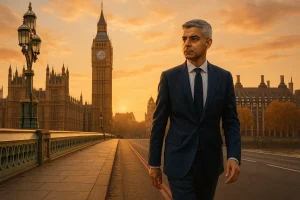
Sadiq Khan has not yet confirmed whether he will seek a fourth term in 2028. The political landscape suggests he remains a significant figure within the Labour Party, and there is speculation he may transition into national politics.
Factors that may influence his future plans:
- Labour Party performance at the national level
- Public response to his third-term policies
- Health of the London economy and crime trends
While no legal barrier prevents a fourth term, political fatigue and shifting public expectations may drive a change in leadership by the end of his current term.
How Does Sadiq Khan Compare with Previous Mayors of London?
Sadiq Khan’s leadership differs from those of his predecessors in both style and substance. His focus on progressive urban policy and diversity marks a clear departure from the more populist approaches of Boris Johnson or the technocratic priorities of Ken Livingstone.
| Mayor | Years in Office | Political Affiliation | Notable Policies |
| Ken Livingstone | 2000 – 2008 | Labour/Independent | Congestion Charge, Oyster Card rollout |
| Boris Johnson | 2008 – 2016 | Conservative | Cycle superhighways, Thames Cable Car |
| Sadiq Khan | 2016 – Present | Labour | ULEZ expansion, Homes for Londoners |
Khan’s emphasis on climate action, racial equality, and inclusive governance has resonated with progressive voters, though critics point to rising crime and housing shortages as areas of underperformance.
What Is the Future of London’s Leadership After 2025?
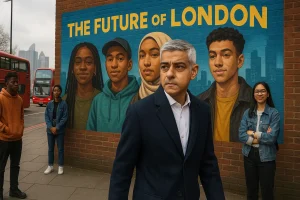
As of 2025, several figures from across the political spectrum are considered possible successors if Khan chooses not to run again.
Potential future mayoral candidates:
- Wes Streeting (Labour): High-profile MP with national ambitions
- Zack Polanski (Green Party): Known for environmental activism and youth support
- Susan Hall (Conservative): Likely to stand again despite her 2024 defeat
Policy debates expected to dominate the next mayoral race include:
- Expansion or reform of ULEZ
- Affordable housing strategies
- Public safety and crime prevention
- Transport innovation and congestion solutions
As London’s demographics evolve and its post-pandemic recovery continues, the city’s political leadership will remain under intense public and media scrutiny.
Conclusion: Is Sadiq Khan Still the Right Leader for London in 2025?
Yes, Sadiq Khan is still the Mayor of London in 2025, having secured a historic third term in office. His leadership has brought notable advancements in transport, housing, and air quality, but it has also faced criticism regarding crime rates, taxation, and cost of living.
Whether he remains in City Hall after 2028 or moves on to a national role, Khan’s impact on the city is undeniable. As London navigates an era of political change and economic uncertainty, his role remains pivotal in shaping the capital’s future.
Frequently Asked Questions
Is Sadiq Khan the longest-serving Mayor of London?
Yes, by 2025, Sadiq Khan has become the longest-serving mayor, having held the position since 2016 and entering his third term.
How many times has Sadiq Khan been elected as Mayor?
Sadiq Khan has been elected three times in 2016, 2021, and 2024.
What political party does Sadiq Khan represent?
He is a member of the Labour Party, ideologically positioned on the soft left.
Has Khan introduced any controversial policies?
Yes, the expansion of the Ultra Low Emission Zone (ULEZ) was both praised and criticised, especially by residents in outer London.
What has Sadiq Khan done for transport in London?
He introduced the Hopper fare, extended the Night Tube, and managed major funding issues within Transport for London (TfL).
Has Khan faced criticism over crime in London?
Yes, particularly around knife crime and violent incidents, although national trends also affect these figures.
Is there a term limit for the Mayor of London?
No, there is no legal limit on how many terms a Mayor of London can serve, as long as they win re-election.



